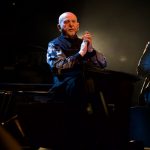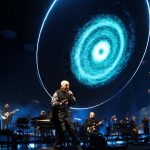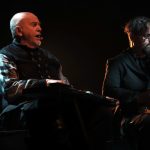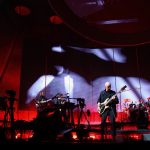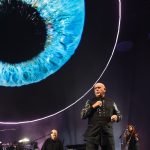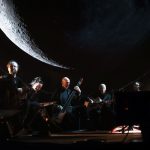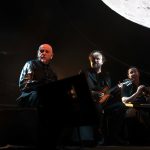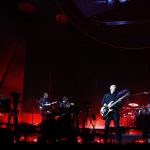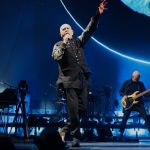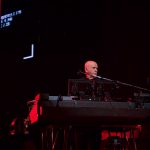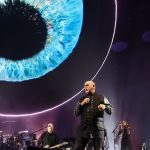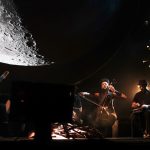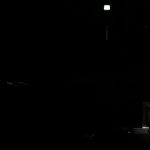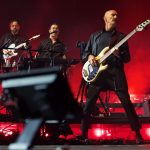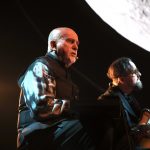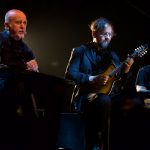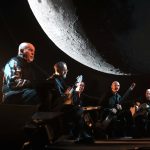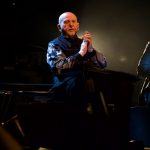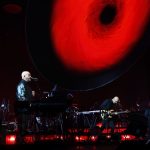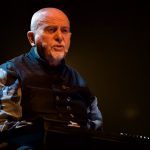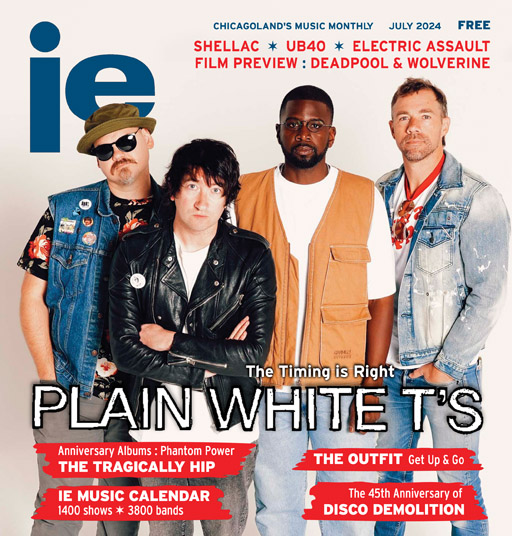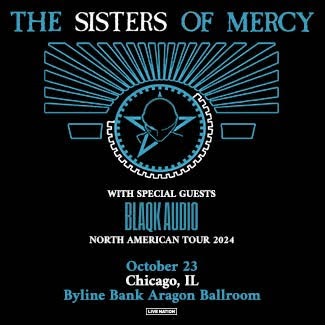Live Review and Photo Gallery: Peter Gabriel at United Center • Chicago
Peter Gabriel
United Center
Chicago, IL
Saturday, September 30, 2023
Review by Jeff Elbel. Photos by Curt Baran.
Peter Gabriel has publicly described a new album called i/o since the days soon following the release of 2002’s Up. The British singer/songwriter and activist even teased individual songs from the long-gestating project on prior trips to Chicago in 2012 and 2016. On Saturday, Gabriel brought a 9-piece group of longtime collaborators and talented new band members to United Center to play all but one track from the forthcoming album. The show did not feature the greatest hits format that some fans may have anticipated, with no appearances of old favorites like “Shock the Monkey” or “Games Without Frontiers.” However, it was an adventurous and skillfully rendered set that emphasized Gabriel’s habits as a forward-thinking artist and as a veteran who has maintained relevance despite such lengthy gaps in his catalog.
Gabriel set an avuncular and amiable tone, emerging alone onto the stage to address the crowd. He talked about time, describing it as possibly being “the real boss, the big boss.” He also suggested that imagination could perhaps wriggle free of time’s claws. Gabriel insisted that the show would proceed with digital avatars like those seen on the ABBA Voyage dates in London and told the crowd that they were being addressed by one such avatar. Instead of a digital version of himself 20 years younger, however, the good-natured Gabriel said he opted for one that was “20 years older, 20 pounds heavier, and completely bald.” The real Gabriel, he insisted, was lying on a tropical beach with the physique of a Greek god.
A mock campfire was set at center stage. Gabriel sat with a keyboard in his lap and was joined by bassist Tony Levin. “We go back so far; we used to have dinosaurs as pets,” said Gabriel of his longtime partner. The two began the show with “Washing of the Water.” Gabriel and Levin were soon joined around the fire by their remaining bandmates, including veterans David Rhodes on guitar and Manu Katché on drums, as well as fresher faces on violin, cello, keyboard, and trumpet. “Growing Up” was also performed in this setting before the band took its upstage positions for the remainder of the show.
The moon cycled through its phases on a screen overhead, echoing Gabriel’s plan currently underway to release each song from i/o on a full moon to his Full Moon Club followers. The first i/o song performed was “Panopticom,” introduced by Gabriel with reflections on artificial intelligence. He acknowledged the dire warnings and fears spread about AI’s humanity-crushing potential but said that we also had the choice to harness AI for previously unimagined refinements in tailored education, healthcare, and even communication with animals. The song described a system that could be used for surveillance to promote accountability and justice from abuses of power.
The evocative “Four Kinds of Horses” made use of deft dynamical shifts while featuring Ayanna Witter-Johnson’s cello, Marina Moore’s violin, and Josh Shpak’s French horn. “I’m just a part of everything,” sang Gabriel afterward on the gentle and whimsical title song “i/o.” The line “stuff going out, stuff going in” expressed the communication and interconnectedness inherent to the “input/output” meaning behind the song and album’s titular acronym.
The deep groove of “Digging in the Dirt” from 1992’s Us followed. The presence of Katché, Levin, and Rhodes as a tight Motown-styled rhythm section was accentuated by Shpak’s trumpet, reminiscent of the Temptations’ “Papa Was a Rolling Stone.” Rhodes lashed into his bristling guitar part as the song brought the crowd to its feet.
Begun as a duet between Gabriel’s piano and Levin’s evocative double bass, “Playing for Time” was joined by lush strings. Gabriel sang about treasuring “any moment that we bring to life,” whether ridiculous or sublime. The crowd spontaneously cheered as Gabriel climbed into his supple falsetto range. The latter half of the song was propelled by Katché’s masterful and musical percussion.
Although part of i/o, “Olive Tree” was also described as part of another brain-related concept under development. Gabriel described current research, including studies at the University of Texas to convert MRI images to text. The jubilant song described a deepened connection to nature and others by a character who wears a helmet allowing him to read thoughts.
“This is Home” expressed gratitude for the calm and comforts of home. Screens behind the band showed everyday images of bookcases, lamps, a garden window, and tumbling laundry. The chorus revealed that true home is found in the heart. “I know that you are my home,” sang Gabriel.
“This show is going to be split into two parts, very much like this country,” said Gabriel wryly. Before leaving for an intermission, the band played a euphoric version of “Sledgehammer,” spilling with sultry innuendo. Levin, Gabriel, and Rhodes stepped in time at center stage as the crowd rose to dance and sing along.
Gabriel and band returned with the industrial pop of “Darkness” and its brave portrait of facing one’s fears. The song led a second set that was equally split between i/o and increasingly familiar fare.
Following the rich and exotic “Love Can Heal,” the interactive screens Gabriel had danced and played with throughout the song failed to rise into the rigging properly, forcing a momentary break. “We’re going professional next week, don’t worry,” joked Gabriel as the hardworking stage crew swiftly brought the situation under control.
Gabriel returned to his brain story for the uplifting “Road to Joy,” describing a once-incapacitated mind whose senses are returned one by one. Keyboardist Don-E took a keytar to face off at center stage with Levin, who played guttural and slippery lines on his Chapman Stick.
The emotive “Don’t Give Up” was a show-stopping duet between Gabriel and Witter-Johnson. Gabriel acted the part of a working man in defeat, answered by Witter-Johnson as a female force of strength and comfort. The pair led the audience in singing the song’s resolute coda. “Amazing voice,” Gabriel said of his cellist and singing partner afterward.
“The Court” was a song about justice, featuring versatile multi-instrumentalist and longtime Gabriel collaborator Richard Evans on flute.
“The weather has been getting stranger,” said Gabriel next. “This is ‘Red Rain.’” The crowd roared for the popular single from 1986’s So album, launching to its feet with a sea of cell phones held aloft to capture video souvenirs. Levin played his distinctive bass line while wearing his “funk fingers,” rubber-tipped sections of drumsticks attached to his right index and middle fingers by Velcro straps.
Gabriel dedicated “And Still” to his late mother. “I carry you inside,” he sang in loving memory. The song was also a beautiful cello feature for Witter-Johnson.
“So, guess what time it is now?” said Gabriel. The energy soared to fever pitch as Gabriel gave a familiar “Hi, there,” introducing the irrepressible funk-pop of “Big Time.”
As the set neared its end, Gabriel reserved time to introduce one more song from i/o. “It seems it’s getting harder and harder to see the humanity in the people on the other side,” he said. “Live and Let Live” was performed as a plea for tolerance, and it wasn’t hard to draw a connection to older socially conscious songs as notable as “Give Peace a Chance.” Accompanied by Gospel-choir vocals, Rhodes’ shimmering guitar, and Shpak’s muted trumpet, Gabriel sang his sermon, “It takes courage to learn to forgive, to be brave enough to listen, to live and let live.”
The second set closed with the sparkling optimism of “Solsbury Hill.” Every voice in the room sang the “boom boom boom” notes of the protagonist’s hopeful heart. Gabriel encored with the enraptured “In Your Eyes,” his voice expressive while climbing to youthful heights. Gabriel concluded by keeping his personal tradition. “It takes enormous courage to stand up for what you believe in,” he said while introducing the dramatic “Biko,” adding dedications to people who are risking life and safety for their principles in the present moment. Richard Evans played stirring pipes while Rhodes played a somber two-note drone against Katché’s thundering tom-tom beat. “As always, what happens now is up to you,” said Gabriel as he left the stage. The crowd continued to sing as each player left one by one, continuing to raise their voices until Katché’s final note signaled the end of a memorable performance.
Category: Featured, IE Photo Gallery, Live Reviews



